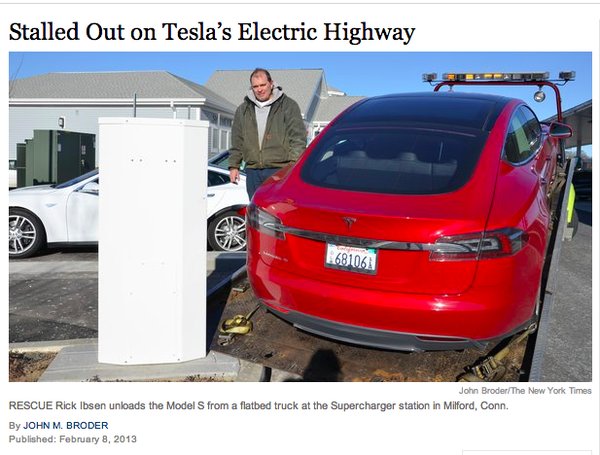Brands
Tesla vs. The New York Times: Everyone’s a Media Company and a Media Critic Now
When talking about content marketing, we often obsess over hard ROI, but there are also intangible benefits: chief among them is not having to communicate through a middle man.
In the pre-Internet age, brands had to rely on a finite set of media outlets if they wanted to communicate with the public: TV stations, radio broadcasters, newspapers, and magazines, most of which were (and still are) controlled by a small handful of mega-corporations.

Today, social media and brand publishing gives brands the power to speak directly to a large, international audiences. In Tesla’s battle last week with the New York Times, we’re seeing just how valuable that direct line can be.
Tesla CEO Elon Musk, armed with 136,000 Twitter followers and a popular brand blog, fought back against a New York Times article by John Broder that offered first-hand account of the Tesla Model S stalling on the highway. Musk fought back on the Tesla blog, alleging that Broder falsified and sensationalized his account. Using data logs from Broder’s media testing, Musk presented compelling evidence to back up his claims. It’s hard to tell who’s right, but Tesla’s side of the story was celebrated and amplified throughout the Twitter and blogosphere.
 In the pre-Internet era, Tesla’s hands would have been tied. If they wanted to get their side of the story out there, their only recourse would be to take it to a journalist at a rival publication, and then hope that the story didn’t get buried below the fold in the middle of the business section. They could try to buy up a bunch of rebuttal ads, but it’s impossible to present a compelling examination of data in a print ad or TV commercial.
In the pre-Internet era, Tesla’s hands would have been tied. If they wanted to get their side of the story out there, their only recourse would be to take it to a journalist at a rival publication, and then hope that the story didn’t get buried below the fold in the middle of the business section. They could try to buy up a bunch of rebuttal ads, but it’s impossible to present a compelling examination of data in a print ad or TV commercial.
Tesla didn’t succeed by using some magic marketing formula; they just did what journalists have been doing for years — finding a story and breaking it. Breaking stories has long shown to be the best way to build an audience, and that applies to brand publishing, too.
It will be interesting to see how Tesla measures the success of Musk’s rebuttal, but beyond the number of sales they estimate that they saved, Tesla has to feel vindicated about the influence and power they’ve demonstrated and gained this week.
And for journalists, it looks like the consequences for sensationalism just got even more serious. I’m not saying that Broder is the guilty party here, but the situation demonstrates how much easier it is for a sensationalist, or even a fabricator, to get caught.
All in all, this may be one of the most compelling case studies for content marketing yet.
Get better at your job right now.
Read our monthly newsletter to master content marketing. It’s made for marketers, creators, and everyone in between.




